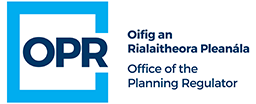An innovative way to better measure and demonstrate the value of planning and how it helps create sustainable and successful places has been published by the Royal Town Planning Institute (RTPI).
The Measuring What Matters: Planning Outcomes Research produced as part of a research project funded by the RTPI, the governments of Ireland, Scotland and Wales, along with the Ministry of Housing, Communities and Local Government and the Office of the Planning Regulator in Ireland, looks beyond simple measurements – such as speed of processing applications and number of houses built – towards more holistic approach.
It builds on steps taken across the nations to improve on how planning performance is measured in terms of outcomes on the ground. The project has culminated in the development of a report and a series of toolkits which can be adapted by local planning authorities across the UK and Ireland to improve their outcome measurement.
It was launched to mark World Town Planning Day on Sunday, 8 November.
It has been designed to better connect policy, decision-making and quality of outcomes in social, economic and environmental terms against a backdrop of huge shifts in legislation, policy and expectations of planning over the past two decades.
Craig McLaren, Director of Scotland and Ireland at the RTPI said: “Good planning can support the post Covid-19 recovery to move towards a green economy, help achieve zero carbon targets and improve communities’ health and wellbeing. Indeed, this has been outlined in our recent research Plan the World We Need. But to date we have not had an effective way of measuring those outcomes or to show the value planning, planners and the planning system bring.
“We need to measure what matters and although this is complex it is essential to determine whether and how the potential wider benefits of planning are being realised. The toolkit can support governments and planning authorities to do that through providing a clearer understanding of how the planning system is performing.”
The research, which builds on the RTPI’s previous work around the Value of Planning, was delivered by a consortium of planning consultancies and academics from around the UK and Ireland led by Kevin Murray Associates (KMA).
Iain MacPherson from KMA said: “If you are what you measure, this risks a system in which success is viewed narrowly through the prism of process and performance, and does not necessarily deliver on quality of life and physical place.
“At a time when we need planning to respond to economic and societal pressures, it needs to demonstrate that it delivers the public interest and longer-term environmental outcomes.”
The research that informed the toolkit identified eight outcome themes:
- Place quality – design and people;
- Health and wellbeing;
- Environment – conservation and improvement;
- Climate change;
- Homes and community;
- Movement;
- Economy and town centres;
- Process and engagement
Niall Cussen, Ireland’s Planning Regulator said : “People know that the benefits of planning go much further than just measuring how fast planning decisions are made. Knowing we are making the right decisions that make that crucial difference for people’s lives is even more critical. Helping to make places that people love, that they feel safe and part of a community in. That leaves little environmental traces. A toolkit to measure the effectiveness of our planning process is long overdue and I believe this work across these islands in sharing expertise in building such a toolkit will be hugely beneficial to both national and local authorities in knowing more about how and where proper planning matters.”
The toolkit, which has been piloted in Ireland and Scotland, will enable planners to monitor, evaluate and even repurpose planning in the public interest. It is intended to be used in a cyclical repeat of monitor, review and application of learning through diagnosis.
About the Research and Toolkit
The publication of the report and toolkit has been supported by the Governments of Ireland, Scotland and Wales, along with the Ministry of Housing, Communities and Local Government and the Office of the Planning Regulator in Ireland and a project Advisory Group. Individuals and organisations from across the UK and Ireland took part in pilots, focus groups, interviews and a survey which have helped to frame this work.
The consortium that developed the toolkit was led by Kevin Murray Associates and included MacCabe Durney Barnes, University of Cardiff, University of Dundee, and Yellow Book Ltd.

